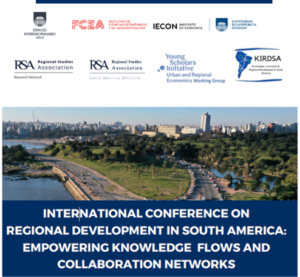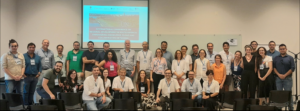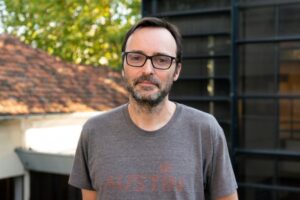Research Network summary
This research network aims to promote research on regional development in South America, focused on knowledge flows and innovation capabilities. Knowledge capabilities are unevenly distributed within national and subnational territories in South America, a region characterized by a peripheral but significant role in the global production of knowledge. These countries have a rich background of research in this field, associated with urban development, production agglomerations, emigration fluxes, and the role of universities, among others. It is highly relevant to articulate research activities aiming to advance our understanding of the regional development processes which promote knowledge creation and improve access to global knowledge flows. This network aims to contribute to facing these challenges by producing relevant evidence and discussing it with policymakers.
Aims and ambitions of the Research Network
Aims and objectives
This Research Network is the first regional development research network in South America, with all the challenges and opportunities that this implies. First, the territorial dimension is particularly relevant. South America has been widely identified as an economic and cultural unit (Cimoli and Katz, 2003; Bértola and Ocampo, 2012). These countries share patterns of economic specialisations, macroeconomic constraints, and a strong heterogeneity within each country. In addition, there are common practical aspects of research, such as the university tradition and some restrictions on access to funding and databases (Arocena and Sutz, 2001; Sutz, 2003; Dutrénit and Arza, 2010). In this sense, research can be enriched through exchange within the network The network aims to bring together regional sciences researchers interested in regional development in South America, working in South American countries or abroad. It is expected to integrate different geographical perspectives: local level, interaction to national specific contexts, and a continental perspective. South America has historically characterized by an heterogeneous development. In this sense, previous experience of members and speakers have shown the relevance of the national and subnational context to understand the process of knowledge creation, innovation and entrepreneurship (e.g. Rapini et al., 2009; Yoguel et al., 2009; Porras-Paez & Schmutzler, 2019; Britto et al., 2020; Ferraz et al., 2020; Galaso & Rodríguez Miranda, 2021; Bianchi et al., 2021).
Proposed plan of events and activities
The network will organize seminars and conferences, with the participation of leading researchers in the field, promoting the discussion of relevant research results to the network’s objectives. In addition, it is expected to coordinate some activities with the RSA Latin-American division. Moreover, these events will promote the integration of researchers who do not belong to the RSA, to invite them to become part of the network and enrich it. These activities will integrate policymakers’ roundtables, aiming to promote the discussion of the research findings as potential policy inputs. In addition to these academic meetings, the network will organize training workshops on data analysis. These workshops will focus on the challenges posed by the availability of comparable regional data due to the lack of statistics at the supranational level. Finally, the network will promote special roundtables at the regular meetings of the RSA, focused on the network’s thematic area.
Forthcoming events
2024
- The first KIRDSA Seminar in the series will take place on 23 October 2024, at 16hs CET. Dr. Pablo Lavarello will present the paper ‘Proximity in the face of technological convergence and the internationalization of agricultural machinery networks: a case study in Argentina’, and Dr. Miguel Atienza will be the discussant. You will be able to connect at this link: https://salavirtual-udelar.zoom.us/j/2888449025
- On 24-25 October, KIRDSA is co-organising the ‘Interdisciplinary Workshop on Econometrics and Complex Networks’, which will take place at the Faculty of Economics of the University of Buenos Aires. In this event, Dr. Sergio Petralia will be the guest speaker, with the support of KIRDSA. More information on this link: https://search.app/FiRZYis7oLekfrqJ9
2025
II International Conference on Regional Development in South America
25-27 February 2025, Campinas, Brazil
This will be the second conference organised by KIRDSA, a Regional Studies Association research network. This conference aims to bring together researchers studying the creation and dissemination of knowledge, in the South American context ,and development processes with a territorial approach in the region’s countries. Participation in the conference is free of charge, and partial scholarships will be available for RSA and/or YSI members presenting papers at the event.
Please find attached the KIRDSA_call_2025 with more information, but here are some relevant details:
- Deadline for submission of abstracts or full papers: September 20th
- Keynote speaker: Ron Boschma (Utrecht University)
- Paper development workshop: TBC (South American scholars)
- Round table with policymakers: Veronica Robert (UNSAM, Argentina), Carlos Bianchi (UDELAR, Uruguay) and Carlos Pacheco (UNICAMP and FAPESP, Brazil)
- Paper presentation sessions
- Young Scholar Initiative special session
If you have questions about the event or the application process, please write to kirdsa.rsa@gmail.com. Please note that we use English for written communications due to the international character of our network; however, you can contact us in Spanish, Portuguese or English.
Past events:
RSA Annual Conference Special Session: Navigating Transitions in Latin America Balancing the imperative for a Just Transition approach with the promise of the Twin Transition. 13 June 2024, Florence, Italy
Chair: Sergio Palomeque, UDELAR, Uruguay
The Legal Geographies of Medicinal Cannabis. Law, Controlled Substances and GPN
Diana Morales, Postdoctoral fellow, Umeå University
New Sources of Knowledge and the Effects on the Technological Diversification of Regions
Renato Garcia, Associate Professor, Institute of Economics – University of Campinas
Navigating Environmental Challenges and Green Transitions: Insights from Latin America’s Eco-innovation Landscape
Fernanda Sperotto, University of Porto
Cities’ Knowledge Base: Local Absorptive Capacities and External Knowledge Complementarity
Sergio Palomeque, Department of Economics – Universidad de la República
Impact of Regional Productive Structure on Economic Development: Empirical Evidence from the Mexican Economy
Diana Prelorenzo, PhD Student, University Sorbonne Nouvelle
International Conference on Regional Development in South America,
EMPOWERING KNOWLEDGE FLOWS AND COLLABORATION NETWORKS, February 7-9, 2024, Montevideo, Uruguay

Organized by RSA KIRDSA Network, with the support of Universidad de la República, the Young Scholar Initiative and the RSA’s Latin America Division.
KIRDSA program Click here for more information.

RSA Annual Conference
Special Sessions: South American Regions Facing Global Knowledge Flows: Challenges and Development Opportunities, 16th June 2023, Ljubljana, Slovenia
This special session aimed to reflect and present evidence on challenges and development opportunities in South American regions facing global knowledge flows. Despite the heterogeneity of the continent, South American regions have shared features that critically affect their development trajectories in economics and social dimension. The shared specialisation patterns and macroeconomic constraints allow comparison between the economies in the target regions. Moreover, educational challenges and demographic transformations permeate the development agenda in countries and regions in South America. In this context, building local capacities to produce and access advanced knowledge has been recognised as necessary to conduct structural transformations, which allow sustainable and inclusive development. This uniqueness of the South American regions highlights the need for a shared space to discuss issues inherent to their development path. However, this discussion must be open to exchange and learn of other regions in the Global South which address similar development challenges that South American economies.
The session had 8 presenters from 4 countries.
- Miguel Angel Marafuschi Phillips: Development of Local Administrative Systems for Argentinean Universities. Challenges and Achievements in the Process of Implementing SUDOCU at UNLP
- Italo Spinelli Da Cruz: Difference in Educational Performance between Students from Rural and Urban Areas in Brazil: An Unconditional Quantile Analysis
- Pablo Galaso: Dual Clusters in Dual Economies: Understanding Innovation in Clusters of Developing Countries
- Sergio Palomeque: Skills Relatedness and Technological Diversification
- Igor Tupy: New Path Creation Facing the Resource Curse: Evidence on Relatedness and Productive Diversification from Brazilian Extractive Regions.
- Ledys Franco: New Path Development or Simply reinforcing the Extractavist Path? The Bioceanic Road Corridor and Potential Implications for Peripheral Regions Development
- Sören Scholvin : The Internationalization of Argentinean Service Providers: A Comparison of Globant and Mercado Libre
- Andrea Belmartino: Green Product Diversification in Argentina: A Challenge for all, but an Opportunity for whom?
After the main selection process of the RSA Conference 2023, we evaluate their alignment with the themes and topics of the special session. Indeed, all the contributions were spatially focus on South American economies, also facilitating a fruitful discussion. We group them into two sessions according to their specific topic and/or empirical approach. In addition, before the session, we assigned one discussant for each presentation.
Following the conclusion of the special session, we seized the opportunity to announce and introduce the upcoming KIRDSA-RSA event. Leveraging the presence of conference attendees, we effectively disseminated and elucidated the event’s objectives.
The special session marked a significant milestone for KIRDSA, as it provided us with the opportunity for our inaugural in-person gathering since the network’s beginning. The papers presented, and the vibrant exchange of ideas during the session underscored the pressing necessity for a platform dedicated to deliberating on regional development from a distinctly South American standpoint.
RSA Professional Development Webinar:
Using Patent Data from USPTO to Study Collaboration Networks. Applications for Research in Latin American Countries, Wednesday 6th September 2023
This webinar aimed to introduce participants to the advantages of using USPTO patent data for research on collaboration networks in cities and regions of developing countries, especially in Latin America. In such regions, the scarcity of sub-nationally comparable data and the absence of a regional office that centralizes patents from different countries make the use of USPTO data particularly interesting. The webinar presented the main features of this data source, the advantages of accessing it through the PatentsView platform and some examples of research articles using this data.
The webinar served as an introduction to the workshop held the following week. In this workshop, participants learned more in depth about the applications and methods that use this data and will practice how to use R for processing and analysis of collaboration networks.
Presenter: Pablo Galaso, University of the Republic, Uruguay

Pablo Galaso is an associate professor at the Institute of Economics of the University of the Republic (Uruguay), where he coordinates the Research Group on Development Studies. He is a Level I researcher in the National System of Researchers of Uruguay. His research interests focus on territorial development studies, innovation and social network analysis. He has published several academic papers, chapters and books on these topics. He has participated in and directed several competitive research projects and collaborated in agreements with national and international institutions. Since 2023, he is co-coordinator of the Research Network “Knowledge, Innovation and Regional Development in South America (KIRDSA)” of the Regional Studies Association.
Chair: Andrea Belmartino, Gran Sasso Science Institute, Italy

Andrea Belmartino is a PhD fellow in Urban Studies and Regional Science at Gran Sasso Science Institute (GSSI) in L’Aquila (Italy). She holds a MA in Economics from Universidad Nacional de La Plata (Argentina). She was a research assistant at Universidad Nacional de Mar del Plata (Argentina). Her current research interests are related to regional capabilities to foster the green transition. In addition, she is especially interested in the sustainability challenges and opportunities for Latin American economies. Since 2023, she has been co-coordinator of the Regional Studies Association’s Research Network “Knowledge, Innovation and Regional Development in South America (KIRDSA)”.
RSA members can click here to watch the webinar again, listed under events on demand
ONLINE WORKSHOP:
Using patent data for collaboration network analysis. An application with USTPO data in Patents View